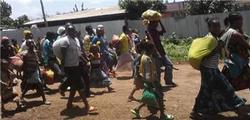In the past few months, tension begun between indigenous Majengir community and Ethiopian highlanders at Godere district, Gambela region. Ethiopian highland settlers in the area have been killing innocent civilians and the retaliations continued. The situation escalated during Ethiopian New year. On Thursday, 11 September 2014 eight (8) Majengir ethnic were indiscriminately murdered in cold blood in their own ancestral land. The highlanders went door to door hunting for Majengir ethnic community and displaced more than 3,000 Majengir people.
 Three thousand Majengir have been displaced by the recent conflict in Godere District. (Photo: Anywaa Survival Organisation)
Three thousand Majengir have been displaced by the recent conflict in Godere District. (Photo: Anywaa Survival Organisation)
About 835 people are in hiding in community church faced with lack of food, water and warm clothing. Godere district being one of the area with thick forest and fertile land in the region, is extremely cold exposing children and elderly people to diseases and hardship.
On Sunday, 14 September 2014, further killing took place resulting in the death of 4 Majengir ethnic. Sources on the ground confirmed that many more innocent Majengir people are believed to have been killed in different Kebeles increasing the number of victims.
Many more are hiding in the bushes where they are hunted down by their attackers. The Ethiopian armed forces and federal police are reported to have been despatched to the bushes looking for Majengir survivors to return home. But it is feared that the community wellbeing is under threat from the armed forced who usually side with their fellow Ethiopian highland population.
Though the regional governor and other high level regional government officials are in the Majengir zone trying to bring things to normality, tension remained high and the effort to bring the communities together has not resulted in peaceful co-existence.
The cause of this high level insecurity and loss of innocent people live, is the Ethiopian government policy that is taking away the indigenous communities land and giving the land to so called investors both foreigners and Ethiopian highlanders. The Majengir like many other indigenous communities; mainly, Anuak, has been pushed off from their traditional land and are left with no option. The Majengir area is a rich area in coffee plantation and the Ethiopian highland settlers want to take this fertile area from the indigenous community. In the recent years, the number of Ethiopian highlanders has increased considerably, threatening the indigenous communities’ livelihoods and way of live. The area was a target for about 70,000 Ethiopian settlers from northern part of the country during brutal military regime.
It is also reported that Ethiopian highland settlers do not obey instructions from the local administrators and are not responding positively to orders from the regional and local administrators. This negative attitude in addition to competition over natural resources are among main factors behind current high level tension and loss of innocent lives.
While the list of those who perished during the current campaign of murder are trickling, the zonal high court president, a Majengir ethnic and his all family were among the victims and his home burnt to the ground. Those in hiding in the community church feared to return home as their attackers remain at large. Their homes and properties have been burnt to the ground.
The government responded by arresting some high level regional, zonal, and district Majengir ethnic group. This is contrary to the abundant evidence that speak for themselves against those who murdered innocent indigenous communities. The arrest includes: regional governor social and economic advisor, a district deputy governor, and a special force commander. Yet, none of the Ethiopian highland settlers who participated in the campaign of murder has been arrested and are at large looking for more victims.
It is be recalled that in 2003, Ethiopian highlanders and TPLF armed forces indiscriminately murdered, displaced, burnt to the ground home belonging to Anuak indigenous community. Nonetheless, Ethiopian government more than ten years after have not arrested any perpetrators.
Ethiopian authorities are believed to be behind the current level of insecurity as the policy of land grabbing failed to address the indigenous communities economic and development needs.
For more information, please contact Nyikaw Ochalla at [email protected].











